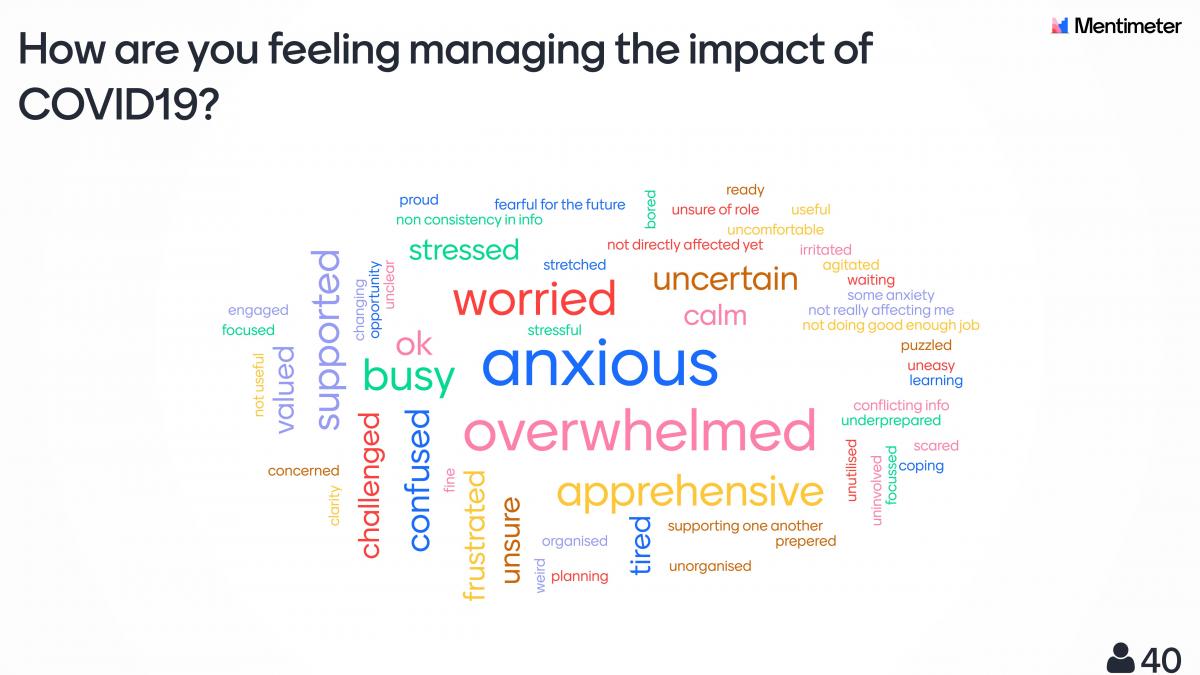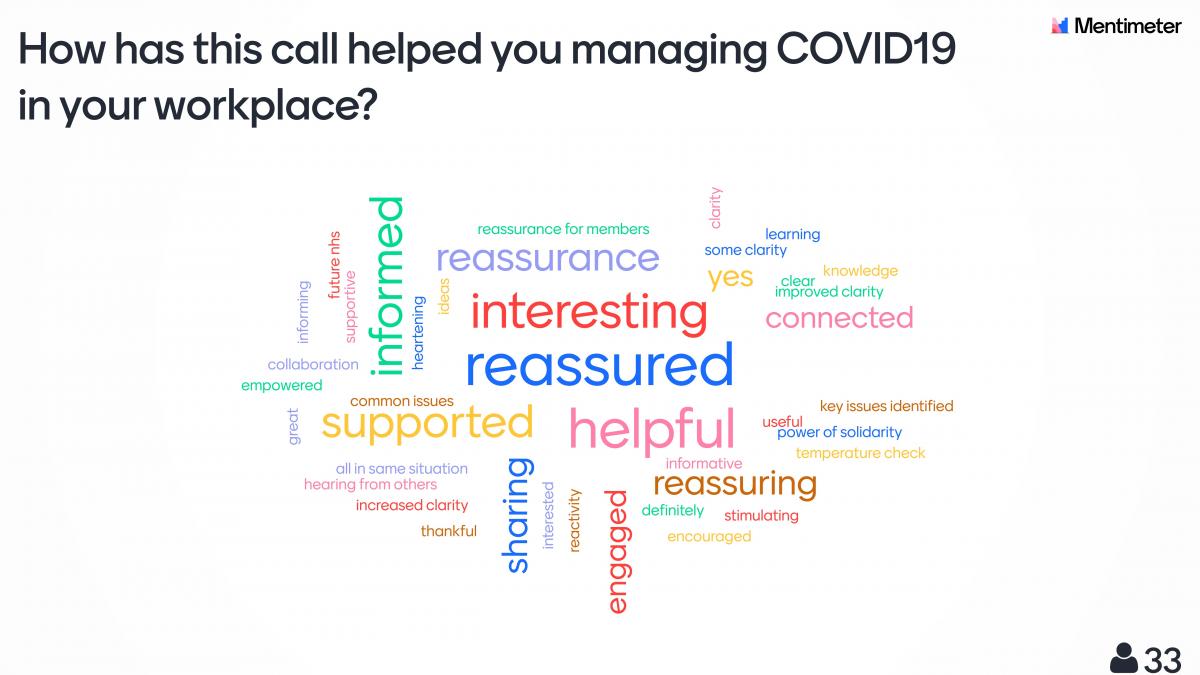On Wednesday 15th April 2020, CSP Scotland staff held a virtual meeting for members in Scotland on the impact of COVID-19 in physiotherapy.
This was an opportunity for members to pose questions to the panel in order to alleviate concerns or gain clarity on issues surrounding working within the profession during the current coronavirus pandemic. Members were also able to share knowledge with each other using the platform’s chat function whilst the meeting was ongoing.
The meeting was hosted by Fraser Paterson (Campaigns and Regional Engagement Officer), with Sara Conroy (Professional Adviser), Claire Ronald (Senior Negotiating Officer) and Julie Collins (Senior Negotiating Officer) answering members' questions. They were supported by Kenryck Lloyd-Jones (Public Affairs and Policy Manager), Nina Strathie (Engagement Support Officer) and Sian Caulfield (Organising Officer).
At the beginning of the meeting, participants were asked to provide feedback via Mentimeter on how they were feeling managing the impact of COVID-19, and the graphic below shows that the key phrases emerging were ‘anxious,’ ‘overwhelmed’ and ‘worried.’

Following an hour of Q&A and discussion, participants were asked how the call had helped them managing COVID-19 in their workplace, and feelings of worry and anxiety were replaced with terms such as ‘supported,’ ‘reassured’ and ‘connected.’

The key issues that emerged from the meeting are summarised below.
CSP PPE Advice Summary
The CSP is following all PHE’s advice on PPE; https://www.gov.uk/government/publications/wuhan-novel-coronavirus-infection-prevention-and-control. However, the CSP takes the view that certain chest physiotherapy techniques intended to increase the strength and effectiveness of someone’s cough as part of an airway clearance regime are AGPs. After seeking expert clinical opinion, the CSP advises that additional physiotherapy interventions are potentially AGPs. These include:
- Manual techniques that may trigger a cough and the expectoration of sputum e.g. expiratory vibrations, percussion, manual assisted cough
- Use of positive pressure breathing devices e.g. IPPB; MI-E
- Intra/extra pulmonary high frequency oscillation devices e.g. The Vest, MetaNeb, Percussionaire
- PEP and oscillating PEP devices
- BubblePEP
- Open suctioning, including nasopharyngeal or oropharyngeal suction
- Manual hyperinflation (MHI)
- Saline instillation via and open circuit / endotracheal tube
- Inspiratory muscle training, particularly if used with patients who are ventilated and disconnection from a breathing circuit is required
- Diagnostic intervetnions that involve the use of video laryngoscopy that can result in airway irritation and coughing
You will find all of our most up to date information on PPE on our website; https://www.csp.org.uk/news/coronavirus/clinical-guidance/ppe-faqs.
The Scottish government has a dedicated e-mail address for supply issues with PPE; covid-19-health-PPE@gov.scot.uk. This mailbox is continuously monitored to allow them to act to resolve any specific supply issues more quickly.
Rehabilitation / Mobilisation
- We are not saying that mobilisation/exercise/rehabilitation is an AGP
- We are saying that minimum PPE needs to be in place depending on your patient/setting as per PHE guidance
- We are saying that there may be individual clinical circumstances/patients where physios feel that the minimum recommended in this guidance is insufficient
- In these circumstances they need to carry out and document a risk assessment and discuss this with line manager, infection control as appropriate
Pregnancy and COVID-19
CSP has a frequently asked question on this:
https://www.csp.org.uk/news/coronavirus/workplace-employment/workplace-faqs#pregnant
There is an obligation on an employer to conduct a risk assessment for pregnant workers and now COVID-19 has to be considered a risk factor – especially in health and social care as the risk in work is greater than the risk outside. The risk assessment must take into account the worker’s wishes.
Prior to 28 weeks pregnant, an otherwise healthy worker must practice social distancing but can continue in a patient facing role, but not with COVID-19 patients. Workers who are over 28 weeks pregnant or have underlying health conditions should avoid direct patient contact, and should reduce unnecessary social contact by working from home where possible.
If you work in the NHS and working from home cannot be facilitated then you should be sent home on full pay. Outside of the NHS, check your contract of employment.
Changing shift patterns
We are aware that at this time patterns of working may have to change due to clinical need. However, the change should be risk assessed and staff must be involved in any decision that affects them. Ongoing monitoring is an important consideration in these temporary shift pattern changes in the current climate. This should focus on the hours people are working and monitoring any adverse impacts on health and wellbeing. To allay staff concerns, the employer needs to confirm in writing that these shift changes are temporary.
Health and wellbeing
During the session, we highlighted a couple of areas under this heading. We talked about advice available on the CSP website to assist you in having difficult conversations potentially in far from ideal circumstances. A useful resource on the CSP website is: https://www.csp.org.uk/news/coronavirus/clinical-guidance/having-difficult-conversations
The second area we talked about was the wealth of places to look for advice on looking after yourself during these challenging times. Two links are provided below:
The HCPC
The CSP
https://www.csp.org.uk/news/coronavirus/taking-care-yourself
There is also guidance issued by the Scottish Government covering the employer’s responsibilities to safeguard the health and wellbeing of employees:
https://www.sehd.scot.nhs.uk/dl/DL(2020)08.pdf
We reminded attendees that CSP safety reps should be the first port of call for members concerned about such issues.
For further comments or queries you can contact us on – scotland@csp.org.uk
Number of subscribers: 1



































